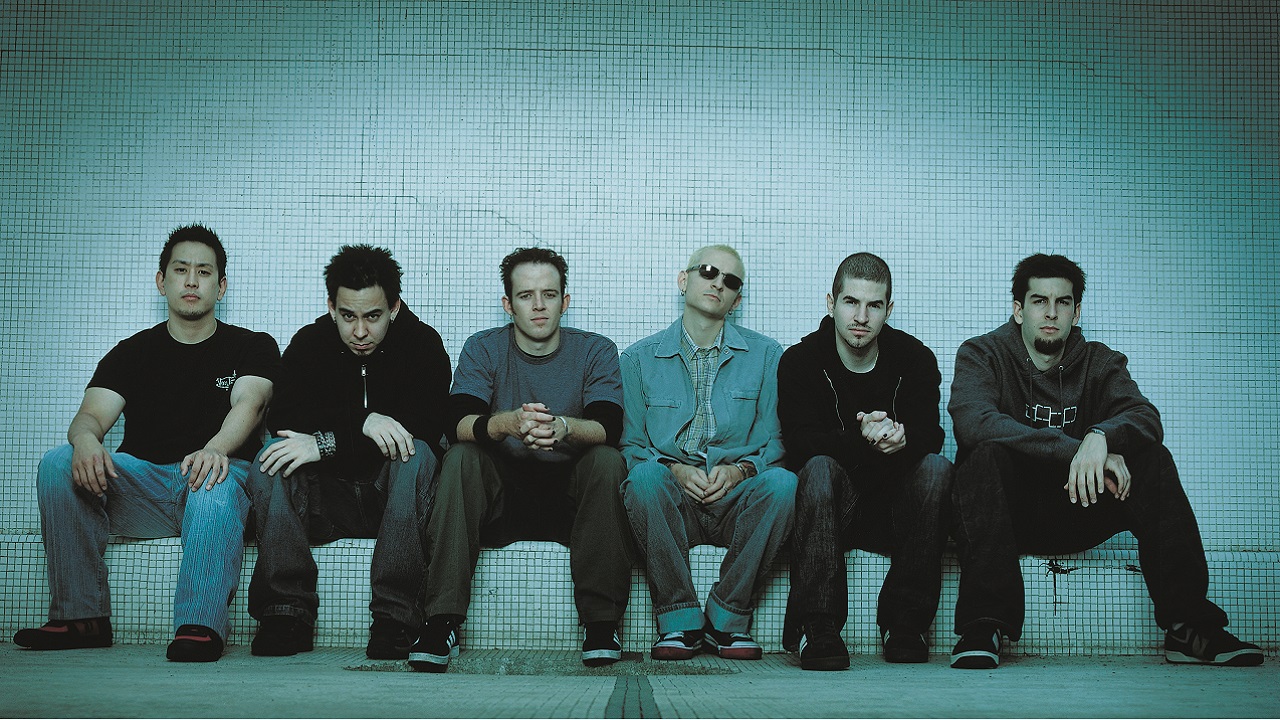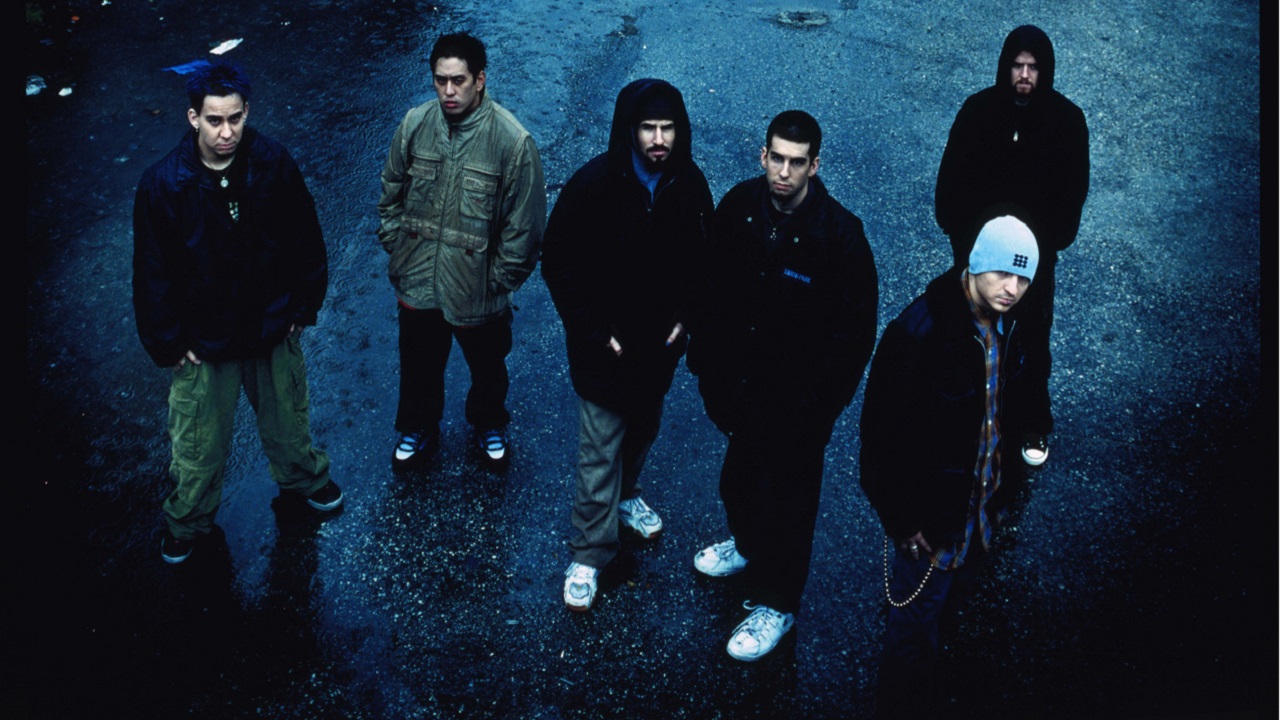
Hybrid Theory was a genre-defining juggernaut. Released in 2000, Linkin Park’s debut album was a jagged blend of metal, hip hop, electronica and irresistible pop choruses, which pushed nu metal to a new mainstream level. The following year, it became the best-selling album in the United States.
By the time the Cali six-piece started creating its follow-up, Meteora, the hype around them was at an all-time high. Recorded at a time when online piracy had started putting the shitters up the music industry, protecting the record became top priority for the band’s label, Warner.
“We had 16 boxes of giant reel tape that we had to take to New York, to go mix the record, on a plane with two security guards,” says Rob McDermott, who managed the band from 2000 to 2010 and was tasked with devising an over-the-top strategy to keep the music secret.
Security measures continued as Meteora’s release date approached, and journalists invited to an exclusive prerelease listening party were asked to give up their phones on arrival. Luckily for Linkin Park’s team, the plans worked.
Speaking to us over Zoom from his home in LA, Rob motions to the shimmering plaques on the wall behind him, including a Hybrid Theory diamond award representing 10 million sales “Warner made those just internally,” he continues, “because we were able to ship four million records around the world without a leak.”
Hybrid Theory might have put Linkin Park on the map, but Meteora proved they were here to stay. Released at a time when the star power of nu metal was beginning to wane, it ushered in a bigger, more polished, anthemic sound, purpose-built for stadiums and festival fields, and produced ubiquitous blockbusters such as Numb and Somewhere I Belong.
“In places in Asia, we started getting to the point where we couldn’t leave our hotel without a planned itinerary and security,” says bassist Dave ‘Phoenix’ Farrell, revealing the band’s profile rose to uncomfortable levels during the Meteora touring cycle. Recalling instances when the band were bundled into vans to escape mobs of fans, Dave says he used an alias every time he checked into a hotel.
“If I want to go to Starbucks, I don’t want it to be a big ordeal. Now I know how to navigate that a lot better, but with Meteora, we were just starting to come to terms with a lot of that. We were learning on the fly.”
Linkin Park started piecing together the songs for Meteora during Ozzfest in summer 2001. Working in a makeshift studio at the back of their tour bus, spirits were high and creative juices flowed: at one point, the band had more than 80 songs in various states of realisation.
By the time they headed into LA’s NRG Studios in August 2002, where they had recorded Hybrid Theory, with returning producer Don Gilmore, they had whittled that down to 13 close-to-complete demos.
Constant interference from label Warner, who questioned everything from the band’s line-up to their vision, had made the Hybrid Theory sessions feel fraught. Due to the album’s success, they now stepped back, allowing the band to make the follow-up they wanted.
It didn’t have the same fresh-out-the-box vigour as their debut, but Meteora is arguably a stronger set of songs – less angsty, deeper and more emotional. And while that’s no doubt due to the band’s growth as writers, Meteora’s ongoing ability to resonate is unmistakably down to late singer Chester Bennington who, despite being sick for five weeks and having to record his vocals alone while the rest of the album was being mixed, put in the strongest performance of his career.
Having struggled with addiction and depression from an early age, the turmoil in the singer’s private life is laid bare in the powerful lyrics for tracks such as Somewhere I Belong, Easier To Run and Numb. The latter would go on to become nu metal’s last true mega hit, passing over a billion streams on both Spotify and YouTube.
“I’ve learned over the years that really great vocalists can mimic many different things,” says Dave. “Chester was that to a T. He could be a trumpet. He could sing like Barry White. He could mimic stuff with his voice, and, because of that, he had such an incredible range.”
Meteora, Dave says, was the sound of the band realising what a potent weapon they had in their midst. “We were like kids in a candy store as we discovered more and more places that he could go vocally.”

Meteora was released on March 25, 2003, to critical and commercial acclaim – although the general consensus was that Linkin Park had played it safe and turned in Hybrid Theory 2.0. Speaking in 2008, Chester agreed. “Within the band, we call Hybrid Theory and Meteora ‘Volumes I and II’,” he told Kerrang!’s Tom Bryant. “They’re very similar in a lot of ways. There’s almost a formula to them, you can tell what each song is going to do next.”
However, Meteora didn’t merely rehash past glories. “We wanted to further define and evolve our sound as well,” rapper Mike Shinoda said. “A song like Breaking The Habit, for example, could never have existed on Hybrid Theory; it was a more mature song, lyrically and sonically.”
To promote the album, alongside five massive singles, the band embarked on a tour lasting from February 2003 to September 2004. The gruelling cycle included their first ever foray into stadiums, supporting Metallica on their 2003 Summer Sanitarium tour, alongside Limp Bizkit, Deftones and Mudvayne. It saw them take on the daunting task of playing to almost a million diehard Metallica fans over two and half months.
The intensive schedule proved especially tough for Chester. Drink and drugs had started to take a toll on his relationship with his bandmates during promotion for Hybrid Theory, but by the end of the Meteora tour, he was in an even darker place.
“I wasn’t leaving my house. I’d shack up in my closet in the dark and shake all day,” he told Tom Bryant. “I’d wake up and have a pint of Jack Daniel’s to calm down, then I’d pop a bunch of pills and go back in my closet and fucking freak out for the rest of the day. I was a mess. I was falling through windows, having seizures and going to hospital the whole time. It was fucking ridiculous. I was a total wreck.”
“He’d talk about it later, but in the moment, you wouldn’t notice it,” says Rob McDermott of Chester’s mindset at the time. “He left it all out on the stage. To me, that was his therapy. He was there. He was in that moment feeling the pain of everyone and himself.”
If Chester was struggling with his mental health on the road, he hid it well, according to P.O.D.’s Sonny Sandoval, who supported Linkin Park on the North American leg of the Meteora tour in 2004.
“He was a sweetheart,” he remembers. “He had something about him that lit up the room.” Sonny describes the tour, which also featured Hoobastank and The Story So Far, as a real “family” affair. Each night, the bands would hang out in each other’s dressing rooms, smoking shisha and drinking, while later Chester would invite everyone onstage together to perform the band’s incendiary closer, One Step Closer. Those bonds of friendship were put to the test one night, however, when the bands and crew celebrated on the roof of a high-rise hotel.
“At one point, we all get excited, not even realising that we’re so close to the edge,” recalls Sonny, revealing his heart still races when he tells the story.
“I picked up Chester and, not even realising and just having fun, he flings back. Literally, if he had fallen out of my arms, he would have fallen off this roof. But I had him so tight, and then he was just dangling there screaming, and I am panicking, freaking out. I told him, ‘Bro, I could have dropped you.’ And then he looked at me and said, ‘You would never have dropped me.’ And then he just gave me a big old hug.”
The cultural impact of Meteora went far beyond its initial burst of success. In 2003, Session, the album’s eerie instrumental track composed entirely of scratching and sampling, courtesy of turntablist Joe Hahn, was nominated for a Grammy. The following year, the band teamed up with rapper Jay-Z for the now iconic, MTV-sponsored mashup collab, Collision Course.
“Mike had just gotten off the phone call with management saying, ‘OK, Jay-Z wants to do this new thing through MTV with us,” says Dave, remembering the moment they heard the news. “At that point, Jay was an artist that we loved – one of our favourite rappers. We were like, ‘Holy crap, we don’t know what that means, but yup, let’s make this happen.’”
In 2006, the band and Jay-Z won the Grammy for Best Rap/ Sung Collaboration for Numb/Encore, and performed it at the awards ceremony, with a star vocal turn from Paul McCartney.
“The first time I met Paul, he showed up to a rehearsal and I was terrified,” says Dave, who cites working with the Beatle as a career highlight. “I was terrified that he was going to be disgusted with my bass playing – why am I playing bass if Paul McCartney’s here? That didn’t make sense in my head. I don’t think I slept the night before that first rehearsal, but it couldn’t have been anything more the opposite.”
Twenty years on, Meteora is rightly viewed as a modern classic, and has sold 27 million copies worldwide. In February, the band surprise-released Lost, a gloriously wistful, clenched-teeth track from the Meteora sessions that had been languishing on one of Mike Shinoda’s hard drives. Originally left off the album because the band felt it was too similar to Numb, it sounds nostalgic yet fresh – a gift to the legions of fans who thought they’d never hear Chester’s voice on a ‘new’ song again.
It’s also a testament to how much gas was in the tank during Linkin Park’s early days. Having reached a level in their career they could never have imagined, the band would take a left turn with their third album, 2007’s Minutes To Midnight, working with producer Rick Rubin to strip down their sound and enter a brand new era.
“Meteora really set the stage for us to make Minutes To Midnight and to begin to branch out,” agrees Dave, considering the album’s legacy. “But I think more than anything, it needed to prove to listeners that what we had done or accomplished on Hybrid Theory wasn’t an accident, and that we did have something to say.”
Meteora 20th Anniversary Edition is out now








